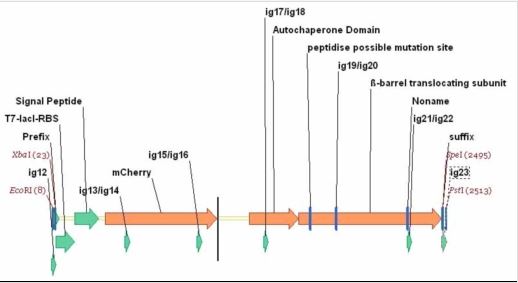PET-mCherry
From 2013.igem.org
(→Design) |
(→Design) |
||
| Line 8: | Line 8: | ||
To comply with BioBrick standard 10, Phe-76 was re-optimized to remove a EcoRI site withing the part. A T7 promoter with a lacI operator was added with the RBS (AGGA) to the PET_mCherry. A standard assembly 10 prefix and suffix was then added. In future work, other autodisplay technologies are hoped to be tested to express a number of proteins. | To comply with BioBrick standard 10, Phe-76 was re-optimized to remove a EcoRI site withing the part. A T7 promoter with a lacI operator was added with the RBS (AGGA) to the PET_mCherry. A standard assembly 10 prefix and suffix was then added. In future work, other autodisplay technologies are hoped to be tested to express a number of proteins. | ||
| - | [http://www.uniprot.org/uniprot/O68900 | + | [http://www.uniprot.org/uniprot/O68900 Uniprot] |
[[File:PET_mCherry_sequence_map.jpg]] | [[File:PET_mCherry_sequence_map.jpg]] | ||
Revision as of 22:51, 27 September 2013
Pet-mCherry is a β-barrel autotransporter with a mCherry passenger.
Contents |
Motivation
In 2012 the Georgia Tech iGEM team developed a novel biosensor based off of green fluorescent protein. The sensor consisted of two subunits of the protein that separately were inactive but once dimerized expressed fluorescence. From this project, we began thinking about how we could develop more complex sensing technology in bacteria. Taking into consideration how mammalian cells sense and react to their environment, we started asking the question: Can bacteria express human integrins?
To start answering this question, we needed to find a way to transport large proteins and anchor them to the outside of the cell. Autodisplay technology seemed like one possible solution to this problem.
Design
To comply with BioBrick standard 10, Phe-76 was re-optimized to remove a EcoRI site withing the part. A T7 promoter with a lacI operator was added with the RBS (AGGA) to the PET_mCherry. A standard assembly 10 prefix and suffix was then added. In future work, other autodisplay technologies are hoped to be tested to express a number of proteins. [http://www.uniprot.org/uniprot/O68900 Uniprot]
Assembly
Characterization
References
<references/>
 "
"
